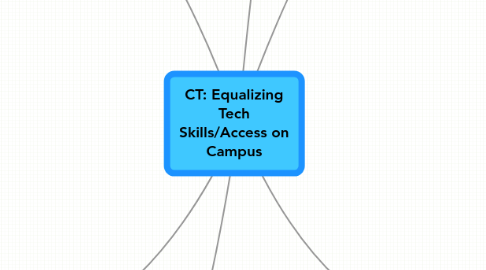
1. Skills
1.1. intellectual property
1.1.1. fair use
1.1.2. creative commons
1.2. Issues
1.2.1. work/life balance
1.2.2. ethics
1.2.3. privacy
1.2.4. security
1.2.5. digital citizenship
1.3. internet consumer vs internet producer
1.4. Local campus resources
1.4.1. discovery of common campus resources
1.4.1.1. UMOD
1.4.1.1.1. Email & Groupnames
1.4.1.1.2. but you can do more!
1.4.1.2. ITCS
1.4.1.3. Duderstadt
1.4.1.4. Libraries
1.4.2. discovery of new resources
1.4.2.1. new resident hall website
1.4.2.1.1. students can link to their Facebook presence
1.4.2.1.2. online social / collaboration space
1.4.2.2. what's new with tech on campus?
1.5. Actual research skills
1.5.1. missing from high schools
1.5.2. evaluation of content
1.5.3. plagiarism (unintentional)
1.5.3.1. citation
1.5.3.2. original source materials
1.5.3.3. diversity of sources
1.5.3.4. identifying sources
1.5.3.5. attribution
1.5.4. boolean searching / keywords
1.5.5. advanced web searching
1.5.6. logic
1.5.6.1. precedence of logical operators
1.5.6.2. and/or
1.5.7. critical thinking
2. Type of Tech
2.1. Apple
2.1.1. free licence
2.1.2. apply through educational support group
2.2. Mobile/Cell
2.2.1. faculty/student digital divide
2.2.2. smartphones
2.2.3. iPhone/iTouch/Android
2.2.4. iPad
2.2.5. SEE SoPharm survey
2.2.6. internet accessibility for devices
3. Solutions
3.1. Mentoring
3.2. Scaffolded instruction
3.2.1. learn one, teach one, pass it along
3.3. Clarify in advance what TECH is required for each class
3.3.1. prereqs
4. Questions/Challenges
4.1. How to get folk to understand what skills are needed?
5. Roles
5.1. As a prof
5.1.1. make podcasts
5.1.2. edit parts of wikipedia
5.1.3. offer alternate access
5.1.3.1. alternate assignments
5.1.3.2. know where is public access, loaners
5.1.4. talk about why it is important & relevant
5.1.5. group assignments
5.1.6. can we get faculty up to level of students?
5.2. Fellow students
5.2.1. partner, work in small groups
5.2.2. share
5.2.3. tutors
5.3. Management
5.3.1. guides or lists of tech access, loaners, etc
5.3.2. get tech in department
5.3.3. sharing agreements
5.3.4. departmental collaborations
5.3.5. purchase collaborations
5.3.6. find out who is doing what on campus
5.3.6.1. surveys
5.3.6.1.1. during orientation
5.3.6.1.2. as annual campus overview?
5.3.6.2. tracking
5.3.6.2.1. incorporated into campus systems (such as UMOD)
5.3.6.2.2. MCommunity
5.3.6.3. questions
5.3.6.3.1. where is campus community in social media?
5.3.6.3.2. what tech is being used by campus community?
5.3.6.3.3. what gaps/needs IDed as important by community?
5.4. Support staff
5.4.1. noncourse support
5.4.1.1. workshops
5.4.1.1.1. Images
5.4.1.1.2. intellectual property
5.4.1.1.3. best practices
5.4.2. IDENTIFY those who need help
5.5. Librarians
5.5.1. guides to tech resources on campus
5.5.2. guides to ????
5.5.3. reference support
5.5.4. support discovery
5.5.5. podcasts
5.5.6. see SKILLS
5.6. IT staff
5.6.1. outreach
5.6.2. find the problem / weak points
5.6.3. develop/support emulators where appropriate
5.6.4. site licenses
5.6.5. MCommunity
6. Resources
6.1. Equipment loans
6.1.1. LS&A/ISS
6.1.1.1. cameras
6.1.1.2. equipment
6.1.2. Duderstadt
6.1.2.1. need equivalent service on main campus
6.1.2.2. GROCS
6.2. Enriching Scholarship / TeachTec
6.2.1. doing great work
6.2.2. visibility of all year activities
6.2.2.1. How to create sense of ES as all year activity?
6.2.2.2. How to promote ES collaborations / communities?
6.3. Suggested tools/readings
6.3.1. The Internet and Social Inequalities (book)
6.3.2. EDUCAUSE: The Myth about the Digital Divide (Article) (2006)
6.3.3. U Oregon: Digital divide changing but not for students torn by it (Article) (2010)
6.3.4. Falling through the net (Report) (1999)
6.3.5. The Internet & Social Inequity (Harvard/Berkman web site) (2009)
